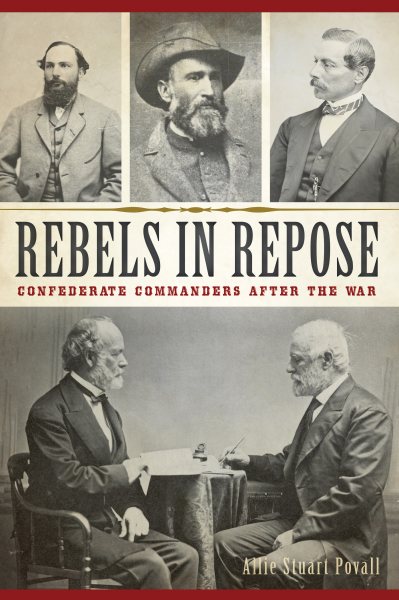Interview by Jana Hoops. Special to the Clarion-Ledger Sunday print edition (January 26)
 Oxford resident and retired attorney Allie Povall’s exploration of what became of many of the South’s major military leaders after the Civil War provides an in-depth–and often surprising–look into their lives after they put down their weapons and left the battlefields.
Oxford resident and retired attorney Allie Povall’s exploration of what became of many of the South’s major military leaders after the Civil War provides an in-depth–and often surprising–look into their lives after they put down their weapons and left the battlefields.
Rebels in Repose: Confederate Commanders After the War highlights how these men followed their own divergent destinies, and how they interacted with each other: some became friends; others vehemently blamed their counterparts for the loss of the war. Whatever their fates, the memories of the American Civil War would mark them forever.
Povall, a Lexington native, served as a naval officer in the Vietnam War after he received a bachelor’s degree at the University of Mississippi. He went on to earn a law degree from Ole Miss and an LLM from Yale Law School, then enjoyed a long and successful legal career before his retirement in 1998.
He has authored three previous books, including The Time of Eddie Noel, a finalist for the Mississippi Institute of Arts and Letters Best Nonfiction Award in 2010, as well as Forward Magazine’s Best True Crime award that same year.
What influenced your interest in the Civil War and inspired your idea to write Rebels in Repose: Confederate Commanders After the War?

Allie Povall
I grew up in Lexington, Miss., and I was raised on Civil War lore. I had three great-grandfathers who served in the Confederate Army and a number of great-great uncles who also served, at least one of whom died at Shiloh. One of my high school teachers was Margie Riddle Bearss, and her husband eventually became historian of the National Park Service and an expert on the Civil War. She did much to kindle my interest in that conflict. By the time I finished high school I had, following Mrs. Bearss’s guidance, studied and written about the Civil War in depth.
Later, I would lose that interest and move on to other things, like law, but later in life–after I retired from the practice of law–I began to wonder about both Confederate and Union generals and what they did after the War. It really was just curiosity. So, I read a book about Robert E. Lee and his years after the War at Washington College, which eventually became Washington and Lee, and I loved the human side–as opposed to his military persona–of Lee as presented in that book. That epiphany led me to take a look at some of the other Confederate commanders, and that process led to this book, which is my fourth.
On what basis did you select the nine officers featured with their own chapters in your book, and the 10 others who were included in the final chapter?
There are no bright lines between the nine and some of the others, and the selection process for the generals to go in the “Ten Others” chapter was, with respect to at least some of those generals, mildly arbitrary. What I tried to do, however, was to address the “major” commanders first and then the lesser known and less major generals second. Some–Richard Ewell for example–in the “Ten Others” chapter might have gone in the first group, but I tried to concentrate on those generals who made the greatest contribution to the Confederate cause, whether good or bad, and there were some bad Confederate generals.
What do you hope your readers will gain from your examination of the fates of these Confederate offices after the Civil War ended?
The Civil War, in my opinion, was the defining event of American History. It left the South in shambles, and it changed in many ways–legal, political and militarily, for example–the way that this country functions. The War, thankfully, ended slavery, and it led to the passage of several amendments to the U.S. Constitution–the Fourteenth, with its “Due Process” and “Equal Protection” clauses in particular–that fundamentally altered American jurisprudence and that extended the protection of “fundamental rights” to all Americans, thus establishing the legal underpinnings of the Civil Rights movement.
In examining the lives of these men–from childhood until their deaths–I have tried, through them, to tell some of the story of American history during the period from about 1820 to the early 1900s. I also address their roles in the War, and in the War’s aftermath, I tell how they took widely divergent paths as they tried to adjust to the Union victory. Some went to Canada, some went to Mexico, and some sought positions in the Egyptian, Rumanian and Brazilian Army, for example.
I want the reader to see how, in some cases, their lives were intertwined after the War, in both good and bad ways, as well as how their lives were intertwined with some of the lives of their Union counterparts. I want the reader to understand, finally, the impact that the War had on the South, and through these men, the impact that it had on its leaders, who, after the War, were just ordinary men trying to make a living in the aftermath of a catastrophic war that resulted in an economically decimated South.
Why is this information still relevant in today’s America, and what lessons can we learn from it?
As I said, I believe that the Civil War was the defining event in American history, and I believe an understanding of it and its aftermath, as I present it in this book, is essential to understanding how we got where we are.
It is, therefore, important, I believe, to see how African-Americans took charge politically of the southern states after the war, only to lose control–even though in some cases they had a majority of the voters–to whites, through violence and the race-inspired Jim Crow state constitutions that deprived blacks of the right to vote and basically, the right to coexist equally with whites. These conflicting forces would give rise to the Civil Rights movement a hundred years later. I hope that my readers can learn that the fundamental underpinnings of the South that arose around the turn of the 20th century were set in motion in the immediate aftermath of the War, and that we must resolve never to let those things happen again.
Please tell me about your next book.
I originally planned to do one book on Confederate and Union commanders, but the combined book would have been too large for most publishers to swallow, so I decided to split it into two companion books. I have started on the Union book–Warriors at Sunset: Union Commanders After the War– and hope to have it done in the next couple of years. If you look at the bibliography for Rebels in Repose, there are about 100 sources and about 400 footnotes. The point is that the research for a book like this is, in a colossal understatement, daunting. Nevertheless, that is my goal, and I am on my way.
Signed first editions (of the paperback original) of Rebels in Repose are available both at Lemuria and its online store.


Comments are closed.